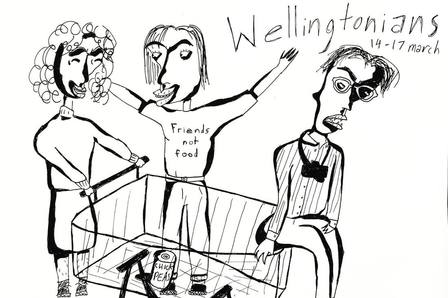Corey Spence
That’s about as clear as I can make it. Wellingtonians is a confusing experience because it’s trying to do so many things simultaneously. It’s a self-deprecating analysis of what being a 19-year-old in Wellington in the twenty-first century might look like, on top of exploring three different character plotlines, on top of touching on themes of mental illness and sexual abuse, on top of introducing AV elements. It’s doing too much in its short runtime, and so, it’s not achieving any of these successfully because we’re passing over to the next idea, story, or theme before we feel closure for the last one.
There are cute one-liners sprinkled throughout, and how the dysfunctional flatmates butt heads and misread one another is humorous, which gives Wellingtonians some relief from the intensity of its themes. Aroha is funny because of her IDGAF, deadpan attitude; when Jack starts mouthing off about everyone being vegan because Charlie’s vegan, Aroha reveals that she is too, and Jack hilariously backpedals.
But the show’s problems completely overshadow any charm. There’s the super-clunky opening, extra characters who serve no function, AV obfuscated by the blocking, and, distressingly, a gag about biculturalism that totally fails and becomes a joke about how long and hard to pronounce Māori names are. And when your mostly pākehā audience is in stitches at the expense of casual racism, I can’t help but groan.
Wellingtonians is superficial and underdeveloped; without a clear voice, all the themes and stories it tackles are pulsed together, forming a glucky, uneven paste rather than the perfect hummus. The talented cast would benefit greatly from a director, who’d be able to guide them in finding the parts of the show that work together, remove anything that’s not adding to their narrative or point, and ensure the work builds up to and treads sensitively around its more challenging ideas, like the sexual abuse. But at present, Wellingtonians is an awkward forty-five minutes, one that earns cheap laughs, but has no real pay-off or premise.






